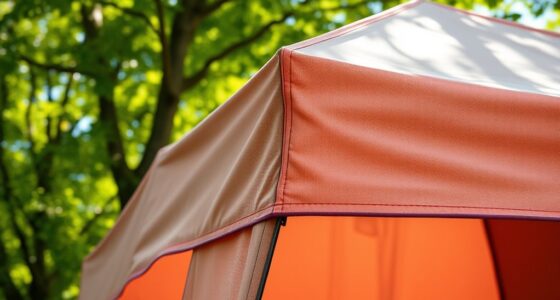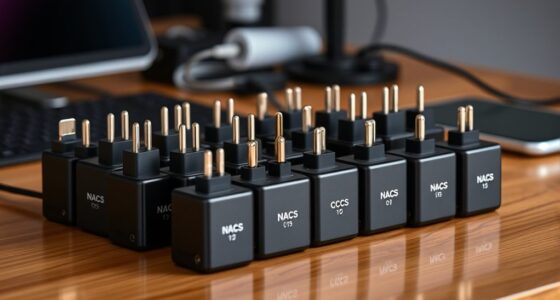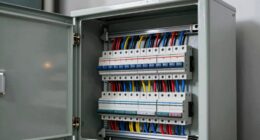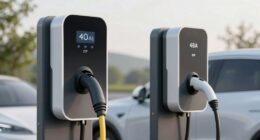Looking for reliable portable power stations around 2000W for off-grid use in 2025? I recommend models like the OUPES Mega 1, Exodus 2400, Jackery Explorer 2000 v2, and DJI Power 2000, which offer high power, fast recharging, and durable LiFePO4 batteries. They’re perfect for camping, emergencies, or remote work. To find out which match your needs best, keep exploring the options below—they’re all designed to keep your devices running when it matters most.
Key Takeaways
- Prioritize units with 2000W+ continuous output, such as Jackery Explorer 2000 v2 and BLUETTI Elite 200 V2, for reliable off-grid power.
- Select models with LiFePO4 batteries offering 3000+ cycles and 17+ years lifespan for long-term dependability.
- Consider units supporting fast recharge (under 1 hour to 80%) via AC or solar for quick off-grid readiness.
- Ensure sufficient solar input capacity (500W-1440W) to maintain recharging in low sunlight conditions.
- Balance portability and capacity, favoring lightweight units like Jackery Explorer 2000 v2 for mobile off-grid applications.
OUPES Mega 1 Portable Power Station (2000W, 1024Wh)
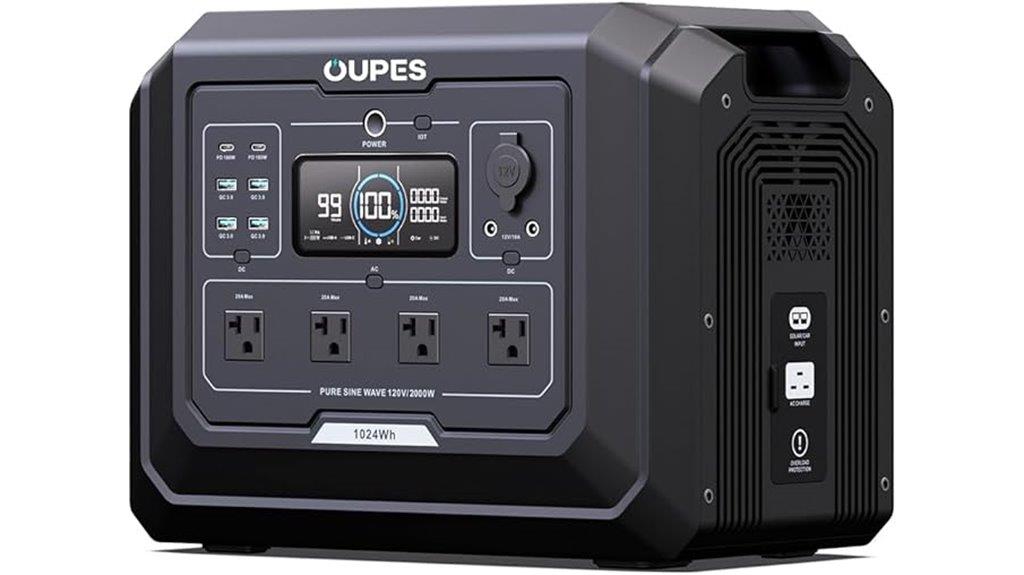
If you need a powerful, versatile portable power station that can handle high-watt appliances and expand as your energy needs grow, the OUPES Mega 1 is an excellent choice. It features a 1024Wh LiFePO4 battery that’s reliable and safe, plus it can be expanded to 5120Wh with an extra battery, surpassing most competitors. Its 2000W continuous output (4500W peak) powers appliances like refrigerators and CPAP machines effortlessly. With 13 versatile outlets, multiple charging options—including solar and car—and fast charging capabilities, it’s perfect for home backup, camping, or RV adventures. The smart app and UPS switch make monitoring and uninterrupted power seamless.
Best For: outdoor enthusiasts, homeowners needing reliable backup power, and RV travelers seeking expandable, high-capacity portable energy solutions.
Pros:
- 1024Wh LiFePO4 battery with expandability to 5120Wh for long-lasting power needs
- 2000W continuous output supports high-watt appliances like refrigerators and CPAP machines
- Multiple charging options including fast solar and AC charging with up to 2200W input
Cons:
- Relatively heavy and large, which may affect portability for some users
- Higher price point compared to smaller or less expandable power stations
- Limited to 13 outlets, which might require additional adapters for certain setups
OUPES Exodus 2400 Portable Power Station (2400W)
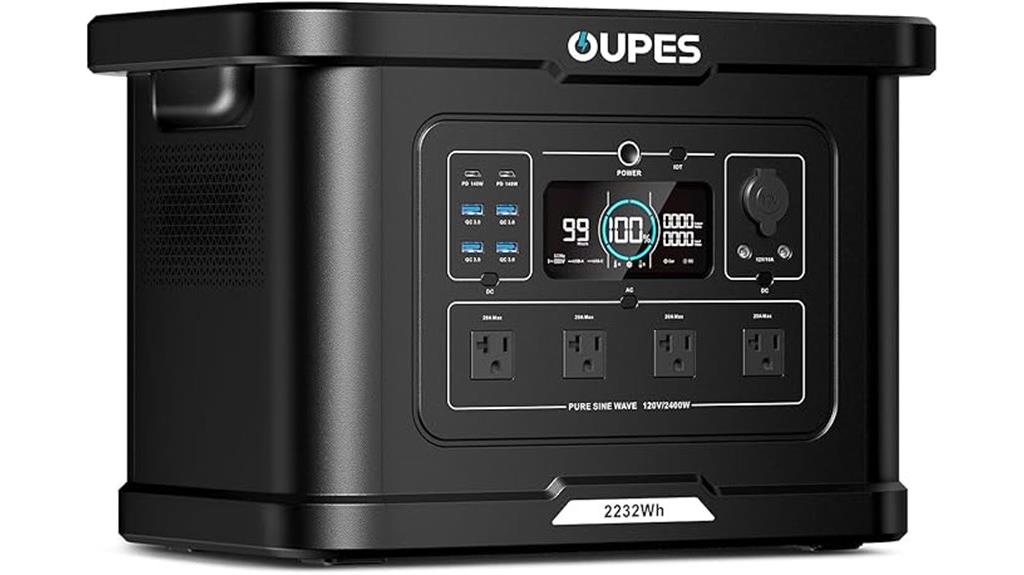
The OUPES Exodus 2400 Portable Power Station stands out for those needing reliable, high-capacity power during outages or off-grid adventures. With 2400W continuous AC output and a 2232Wh LiFePO4 battery, it can run essentials like fridges, CPAPs, and TVs for hours. It features fast charging—0-80% in just 1.2 hours—and is solar-ready with 800W input and MPPT. Equipped with UPS, it switches seamlessly during outages, protecting sensitive electronics. Though somewhat heavy at 45.2 pounds, it offers multiple outlets and app control. Despite some reliability concerns, its performance and value make it a strong contender for dependable off-grid power.
Best For: individuals seeking a high-capacity, reliable portable power station for emergency backup, off-grid adventures, or RV use who need to run multiple high-wattage devices effortlessly.
Pros:
- High continuous power output of 2400W with surge capability up to 4500W, suitable for essential appliances.
- Fast charging from 0-80% in just 1.2 hours and solar compatibility with MPPT for off-grid use.
- Long-lasting LiFePO4 battery with a 5-year warranty ensures durability and safety.
Cons:
- Heavier and bulkier at approximately 45.2 pounds, which may affect portability.
- Some users experience reliability issues such as error codes and unpredictable resets.
- Customer service responses can be inconsistent, impacting overall user satisfaction.
OUPES Mega 1 Portable Power Station (2000W/4500W Peak, 1024Wh)
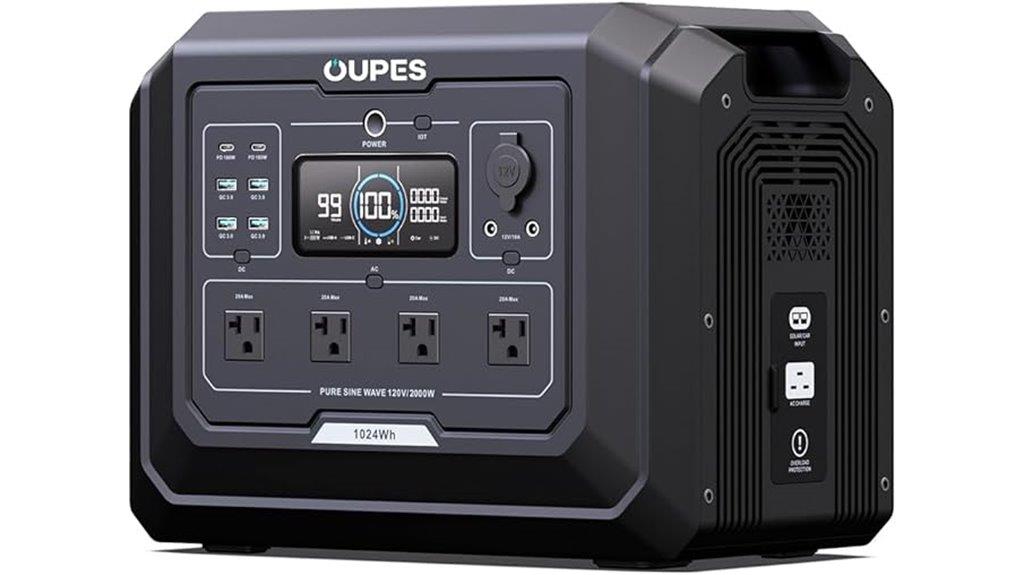
The OUPES Mega 1 Portable Power Station stands out with its robust 1024Wh LiFePO4 battery and impressive 2000W continuous power output, making it ideal for supporting high-watt appliances like refrigerators and CPAP machines during outages or off-grid adventures. Its expandable design allows you to increase capacity to 5120Wh with an additional B2 battery, surpassing many competitors. With 13 versatile outlets—including AC, USB-C, USB-A, DC, and a car lighter—it’s highly adaptable. Multiple charging options, such as solar, AC, or car, combined with fast and slow charging modes, ensure reliable, flexible power management. Smart monitoring via WiFi or Bluetooth adds convenience and control wherever you go.
Best For: outdoor enthusiasts, homeowners, and emergency preparedness individuals seeking reliable, expandable portable power for appliances, camping, or power outages.
Pros:
- High capacity of 1024Wh with expandable options up to 5120Wh for versatile energy needs
- Powerful 2000W continuous output supports high-watt devices like refrigerators and CPAP machines
- Multiple charging methods including fast solar, AC, and car charging with smart app monitoring
Cons:
- Heavier and bulkier compared to smaller portable power stations, which may impact portability
- Higher upfront cost due to advanced features and expandable design
- Limited to 2000W continuous power, which may not suffice for very high-wattage appliances
Jackery Explorer 2000 v2 Portable Power Station
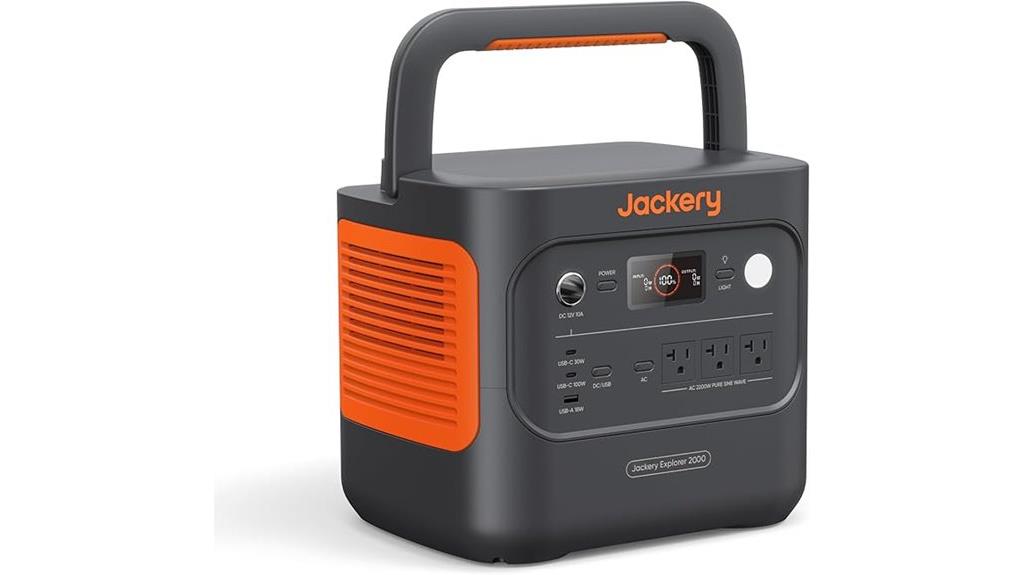
For those seeking a portable power station that combines high capacity with lightweight design, the Jackery Explorer 2000 v2 stands out as an excellent choice. It features a 2042Wh LiFePO4 battery, providing reliable energy storage for various applications. With three AC ports delivering up to 2200W, it’s perfect for home backup, camping, or small business needs. Weighing just 39.5 pounds, it’s one of the lightest 2kWh units, thanks to advanced CTB technology. Fast charging options include AC, solar, and silent modes, while its durable design guarantees safe, quiet, long-lasting operation—making it a versatile off-grid power solution.
Best For: individuals or small businesses seeking a lightweight, high-capacity portable power station for home backup, camping, or off-grid applications.
Pros:
- High-capacity 2042Wh LiFePO4 battery ensures reliable energy storage and long lifespan
- Lightweight design at 39.5 lbs makes it the smallest and easiest to transport 2kWh unit
- Multiple fast charging options, including AC, solar, and silent modes, for versatile and quick recharging
Cons:
- Still relatively heavy for some portability needs despite being lighter than comparable units
- Limited to three AC ports, which may be insufficient for extensive power needs
- Requires an actual shipping address, not PO boxes, for delivery
Jackery Explorer 1000 v2 Portable Power Station
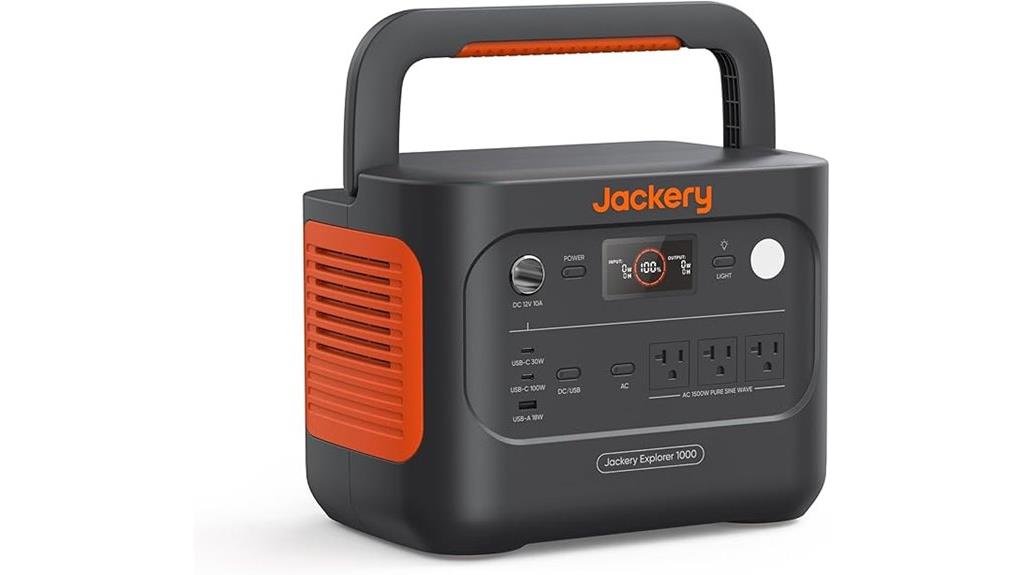
If you’re seeking a reliable power source that can handle essential appliances during off-grid adventures or emergencies, the Jackery Explorer 1000 v2 stands out with its robust 1,070Wh LiFePO4 battery and 1,500W AC output. Weighing just 23.8 pounds and featuring a compact design, it’s perfect for camping, RVing, or backup power. It offers versatile ports, including USB-C, USB-A, DC, and multiple AC outlets, supporting multiple devices simultaneously. Its quiet operation and quick recharge—about 1.7 hours—make it convenient. Built with durable, long-lasting LiFePO4 batteries, it maintains over 70% capacity after 4,000 cycles, ensuring dependable power for years.
Best For: outdoor enthusiasts, RV travelers, and emergency preparedness individuals seeking a reliable, portable power solution for essential devices.
Pros:
- Long-lasting LiFePO4 battery with over 4,000 charge cycles and 10+ years lifespan
- Compact, lightweight design weighing only 23.8 lbs, ideal for portability
- Versatile charging options including AC, solar, and car adapters with multiple output ports
Cons:
- Solar charging efficiency can be affected by panel alignment issues and environmental conditions
- Requires separate purchase of compatible solar panels; not included in the package
- Slightly longer full recharge time in standard mode (~1.7 hours) compared to emergency quick charge
BLUETTI Solar Generator Elite 200 V2 Portable Power Station
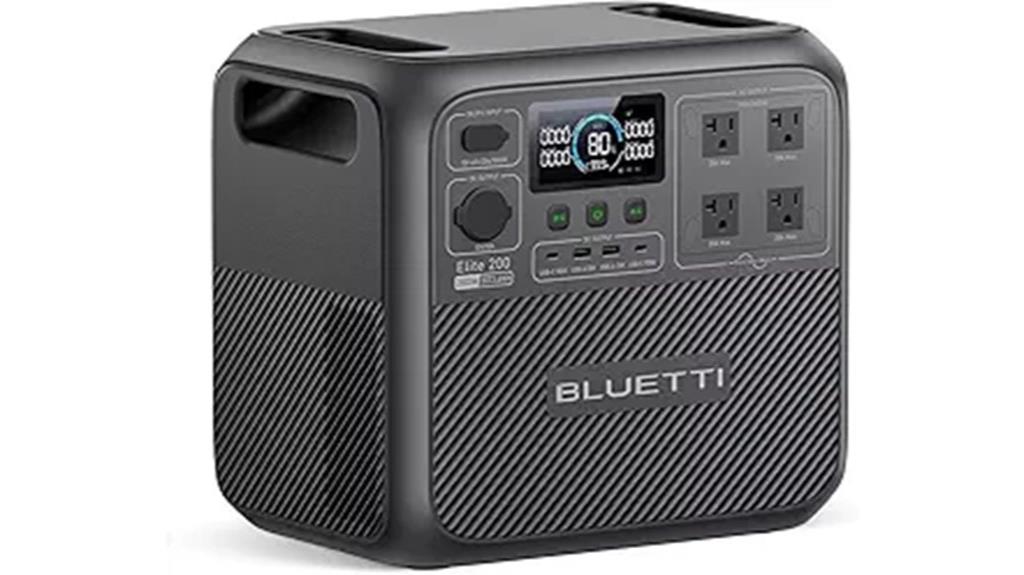
The BLUETTI Solar Generator Elite 200 V2 stands out as an ideal choice for anyone seeking reliable off-grid power with exceptional longevity. It offers a massive 2073.6Wh capacity with LiFePO4 batteries rated for over 6,000 cycles and a 17-year lifespan, ensuring long-term durability. With four 2600W AC outlets and a 2600W inverter, it can power multiple devices simultaneously. Its versatile charging options include AC, solar via MPPT, and car charger, with fast recharge times—up to 80% in 50 minutes. Built tough with rugged materials and quiet operation, it’s perfect for camping, emergencies, or remote work.
Best For: outdoor enthusiasts, emergency preparedness, and off-grid users seeking reliable, long-lasting portable power with fast charging and versatile device compatibility.
Pros:
- Long lifespan with over 6,000 cycles and 17-year durability thanks to LiFePO4 batteries
- Fast dual-input charging: up to 80% in 50 minutes with TurboBoost technology
- Multiple outlets and ports, including AC, USB-C, USB-A, and car port, for powering various devices simultaneously
Cons:
- Heavier and bulkier compared to smaller portable power stations at approximately 53 pounds
- Not waterproof or fully weatherproof, limiting outdoor exposure in adverse conditions
- Requires careful voltage management for third-party solar panels to ensure optimal performance
OUPES Exodus 1200 Portable Power Station
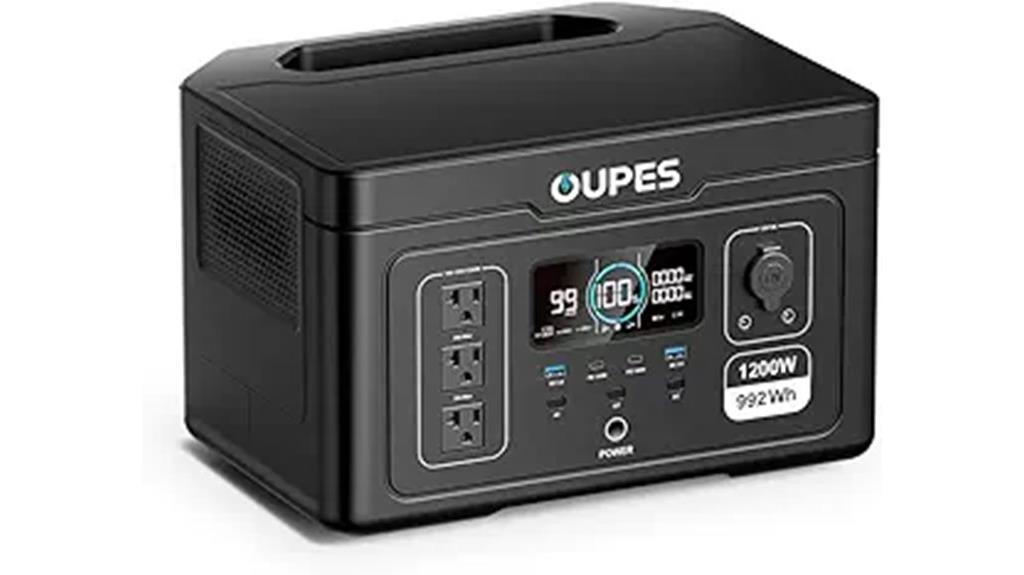
The OUPES Exodus 1200 Portable Power Station stands out with its impressive 992Wh capacity, making it ideal for those who need reliable, extended off-grid power. It can run a fridge for over 25 hours, charge phones 60+ times, and power high-drain devices like microwaves or drills with its 1200W rated output and 3600W surge. With 10 versatile ports—including AC outlets, USB-C PD, and car sockets—it supports multiple devices simultaneously. Smart app control allows remote monitoring and protection of sensitive electronics. Lightweight at 23 lbs and built with durable, safety-certified LiFePO4 batteries, it’s perfect for camping, emergencies, or job sites.
Best For: outdoor enthusiasts, families, and professionals seeking a reliable, portable power source for camping, emergencies, or job sites.
Pros:
- High-capacity 992Wh battery provides extended power for multiple devices.
- Multiple versatile outlets, including AC, USB-C PD, and car sockets, support simultaneous device charging.
- Compact, lightweight design at 23 lbs with durable build and smart app control enhances portability and safety.
Cons:
- May be relatively expensive compared to smaller or less powerful portable power options.
- Charging via solar panels up to 240W may require additional equipment and setup.
- Limited to a 5-year warranty, which, while substantial, may not cover all potential issues beyond that period.
DJI Power 1000 Portable Power Station (1024Wh)
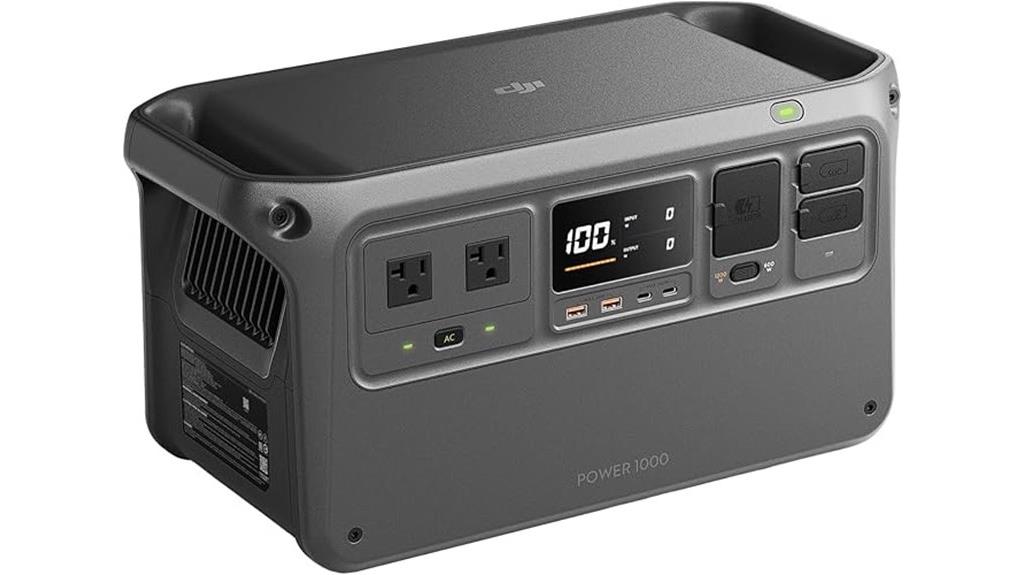
For those seeking a reliable portable power source capable of handling high-wattage devices, the DJI Power 1000 Portable Power Station stands out with its impressive 1024Wh LiFePO4 battery and 2200W continuous output. It’s designed for camping, home backup, and outdoor use, offering fast recharging—0-80% in 50 minutes—and quiet operation at just 23dB. With dual USB-C ports, AC outlets, and solar charging support, it’s versatile and expandable, supporting up to five units for increased capacity. Its safety features, long battery life, and robust build make it ideal for powering laptops, cameras, and even high-power appliances during emergencies.
Best For: outdoor enthusiasts, emergency preparedness users, and professionals needing high-capacity portable power for high-wattage devices.
Pros:
- High-capacity 1024Wh LiFePO4 battery with long lifespan up to 4000 cycles
- Powerful 2200W continuous output suitable for high-wattage appliances and devices
- Fast recharging capability (0-80% in 50 minutes) and quiet operation at 23dB
Cons:
- Heavy and large at 32.6 pounds, which may impact portability
- Additional accessories like solar panels and cables are sold separately, increasing overall cost
- Limited built-in charging ports; expansion requires additional units and accessories
DieHard Portable Power Station 1000W (2000W Peak)
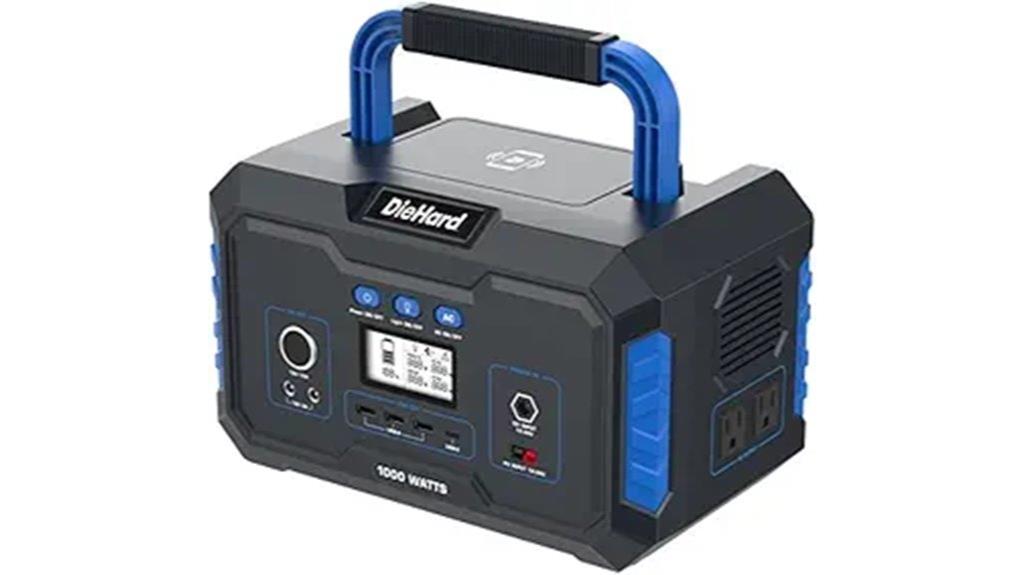
If you’re seeking a reliable portable power solution that can handle a variety of devices, the DieHard Portable Power Station 1000W (2000W Peak) stands out. With a 999Wh lithium-ion battery, it delivers 1000 Watts of continuous AC power and peaks up to 2000 Watts, enough to run computers, appliances, and tools. Weighing just 19.5 pounds, it’s easy to carry for outdoor activities or emergencies. Its pure sine wave output guarantees safe power for sensitive electronics, while multiple charging options—including solar, AC, and car—offer versatility. Built for durability and safety, it’s a dependable choice for off-grid power needs in 2025.
Best For: outdoor enthusiasts, emergency preparedness kits, and professionals needing reliable portable power for sensitive electronics and appliances in various settings.
Pros:
- Lightweight and compact design weighing only 19.5 pounds for easy portability
- Pure sine wave output ensures safe, stable power for sensitive devices
- Multiple charging options including solar, AC, and car chargers enhance versatility
Cons:
- Limited to 999Wh capacity, which may not be sufficient for extended power needs
- Relatively higher price point compared to basic portable power banks
- Requires compatible solar panels (120W or 200W) for solar charging, which are sold separately
BLUETTI Solar Generator AC180, 1152Wh LiFePO4 Battery Backup

Designed for reliable off-grid power, the BLUETTI Solar Generator AC180 stands out with its massive 1152Wh LiFePO4 battery that charges fully in just an hour using 1440W AC input. With 1800W continuous power (up to 2700W peak), it supports multiple devices simultaneously—up to 11 outlets—and can be expanded via the BLUETTI App for higher loads. Its built-in MPPT charge controller accepts up to 500W solar input, enabling full solar recharge in around 3 hours. Perfect for emergencies, camping, or off-grid living, it provides quick, eco-friendly power backup when you need it most. Accessories include cables and a user manual for easy setup.
Best For: outdoor enthusiasts, emergency preparedness, and off-grid living who need reliable, fast-charging portable power with solar versatility.
Pros:
- Rapid full charge in just 1 hour with 1440W AC input, ensuring quick readiness.
- High power capacity of 1152Wh with 1800W continuous output supports multiple devices simultaneously.
- Eco-friendly solar charging capability with MPPT controller allows full recharge in about 3 hours.
Cons:
- Limited solar input capacity of 500W may extend charging times with smaller solar arrays.
- Hefty weight and size could reduce portability for some users.
- Higher upfront cost compared to smaller or less powerful portable generators.
AFERIY P210 Portable Power Station with 2400W/2048Wh LiFePO4 Battery
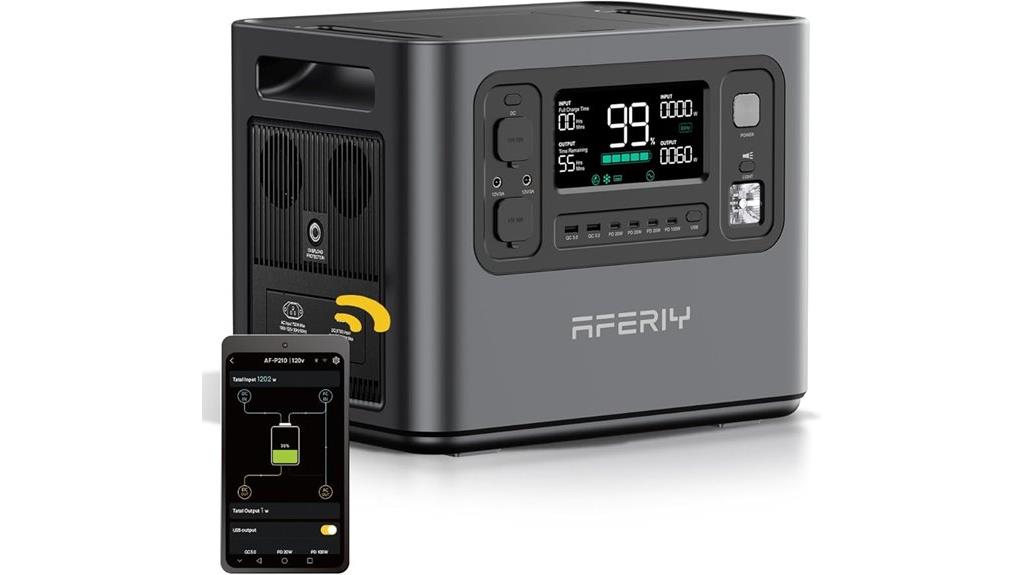
The AFERIY P210 Portable Power Station stands out with its impressive 2400W continuous power output and 2048Wh LiFePO4 battery, making it a top choice for anyone needing reliable, long-lasting energy in demanding situations. Its surge capacity of 4800W handles high-demand devices effortlessly. With quick AC charging up to 1100W and solar support up to 500W, recharging is flexible and eco-friendly. Its compact design and 16 versatile ports let me power everything from refrigerators to medical devices. Plus, the pure sine wave output guarantees safe, stable power for sensitive electronics, making it ideal for off-grid adventures or emergency backup.
Best For: outdoor enthusiasts, emergency preparedness, and off-grid professionals needing reliable, high-capacity portable power.
Pros:
- High continuous power output of 2400W with 4800W surge, suitable for demanding devices
- Long-lasting 2048Wh LiFePO4 battery ensuring reliable energy storage and safety
- Multiple charging options including quick AC recharge and solar support for eco-friendly use
Cons:
- Relatively heavy and bulky for ultra-portable needs
- Higher upfront cost compared to smaller portable power stations
- Limited solar input capacity of 500W may extend recharging times in low sunlight
OUPES Exodus 2400 Portable Power Station

Looking for a portable power station that can handle heavy-duty appliances and tools during outages or outdoor adventures? The OUPES Exodus 2400 delivers with a 2400W rated AC output (4500W peak) and a massive 2232Wh LiFePO4 battery, ensuring reliable power for long periods. It features 13 versatile outlets, including four AC, USB-C PD, USB-A QC3.0, DC5521, and car sockets, supporting a wide range of devices. Recharging is quick—0 to 100% in just 1.5 hours—and solar-ready, with up to 800W input. Its smart technology offers seamless power transfer and remote control, making it perfect for off-grid use, camping, and emergencies.
Best For: outdoor enthusiasts, homeowners, and emergency preparedness individuals seeking reliable, heavy-duty portable power for appliances, tools, and electronic devices.
Pros:
- High power capacity with 2400W rated AC output and 2232Wh battery for extended use
- Fast recharging in 1.5 hours and solar compatibility up to 800W for eco-friendly energy
- Smart features including remote control via WiFi/Bluetooth and seamless UPS power transfer
Cons:
- Hefty weight of 45.2 pounds may reduce portability for some users
- Larger size (17.9L x 10.6W x 12.2H inches) might limit storage options in tight spaces
- Higher price point compared to smaller or less powerful portable power stations
BLUETTI Solar Generator EB3A, 268Wh LiFePO4 Battery Backup
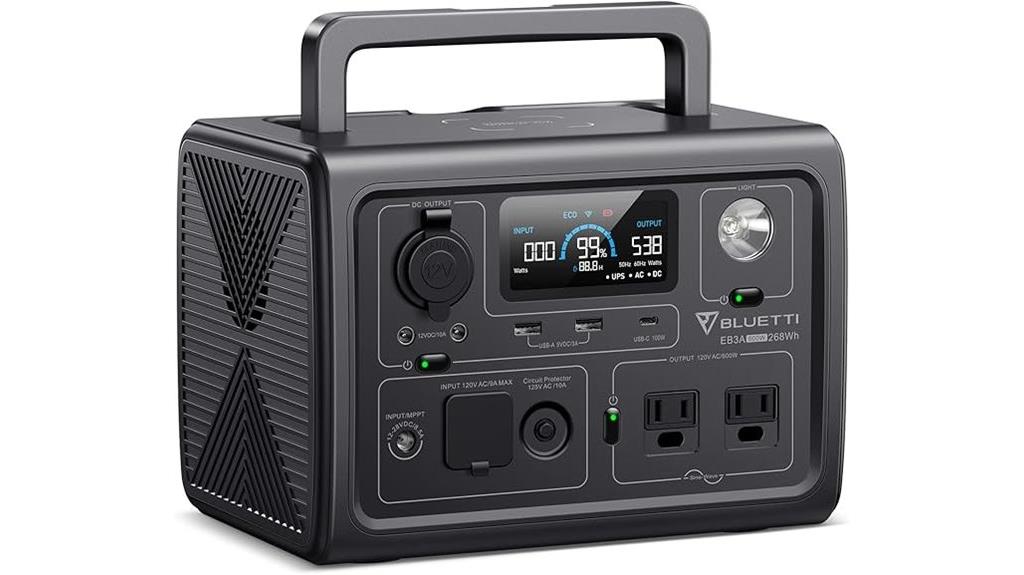
If you’re seeking a compact, reliable backup power source for outdoor adventures or emergency situations, the BLUETTI Solar Generator EB3A stands out with its 268Wh LiFePO4 battery and 600W inverter. Despite its small size, it offers nine outlets to power essential devices. It charges quickly—up to 80% in just 30 minutes with solar and AC—and supports up to 350W of input. Its built-in MPPT controller allows solar compatibility with panels up to 200W, making it eco-friendly. Plus, it acts as an uninterruptible power supply, protecting sensitive electronics during outages. It’s a versatile, portable solution for reliable off-grid power.
Best For: outdoor enthusiasts, emergency preparedness, and anyone needing portable backup power for sensitive devices.
Pros:
- Compact and lightweight design ideal for portability and outdoor use
- Fast charging capability reaches 80% in just 30 minutes with solar and AC power
- Supports renewable energy with built-in MPPT controller and solar compatibility
Cons:
- Solar charging cable not included, requiring an additional purchase for solar input
- Limited battery capacity of 268Wh may not power larger appliances for extended periods
- Only supports a maximum of 200W solar input, which may limit faster or larger solar setups
DJI Power 2000 Portable Power Station (2048Wh)
https://m.media-amazon.com/images/I/61RlW+QhzgL._AC_SX679_.jpg
For those seeking a reliable off-grid power source capable of handling nearly all household appliances, the DJI Power 2000 Portable Power Station stands out with its impressive 2048Wh capacity and 3000W stable output. It can run devices like kettles, projectors, and power tools, making it perfect for camping, DIY projects, or emergency backup. Recharging to 80% in just 55 minutes means minimal downtime. Its safety features, including a smart BMS and flame-retardant housing, assure durability even in tough conditions. With quiet operation and 15 ports, it’s a versatile, portable solution for reliable power during outdoor adventures or blackouts.
Best For: outdoor enthusiasts, emergency preparedness, and off-grid users needing reliable, high-capacity portable power for multiple devices.
Pros:
- High capacity of 2048Wh with 3000W stable output supports most household appliances and power tools.
- Fast recharge to 80% in just 55 minutes minimizes downtime during outdoor activities or emergencies.
- Equipped with safety features like smart BMS and flame-retardant housing for durable and safe operation in rugged environments.
Cons:
- The large capacity and multiple ports can make the unit relatively heavy and less portable for some users.
- The initial cost may be higher compared to smaller or less powerful portable power stations.
- Limited information on long-term battery cycle life and maintenance requirements.
BLUETTI Solar Generator AC70, 768Wh LiFePO4 Battery Backup

The BLUETTI Solar Generator AC70 stands out as an ideal choice for outdoor enthusiasts and preppers that need reliable off-grid power. With a 768Wh LiFePO4 battery, it offers long-lasting durability and safety. The 2000W inverter easily handles essential devices, including small appliances, fridges, and electronics, with a surge capacity of 2000W. Charging is quick—80% in 45 minutes via AC or full in under 2.4 hours with solar panels. Its compact, lightweight design (22.5 pounds) and multiple outlets make it perfect for camping, emergencies, or outdoor activities. Plus, the app support allows remote control and monitoring, enhancing user convenience.
Best For: outdoor enthusiasts, preppers, and anyone needing reliable off-grid power for camping, emergencies, or outdoor activities.
Pros:
- Fast charging capabilities with AC and solar options, reaching 80% in 45 minutes.
- Lightweight and compact design at only 22.5 pounds, ideal for portability.
- Long-lasting LiFePO4 battery with up to 3,000 cycles and stable power output for various devices.
Cons:
- Limited solar input capacity of 500W, which may extend charging time in cloudy conditions.
- The maximum surge power is 2000W, which might not support very high-power appliances.
- Slightly higher price point compared to traditional battery solutions with similar capacity.
Factors to Consider When Choosing a Portable Power Station 2000 W
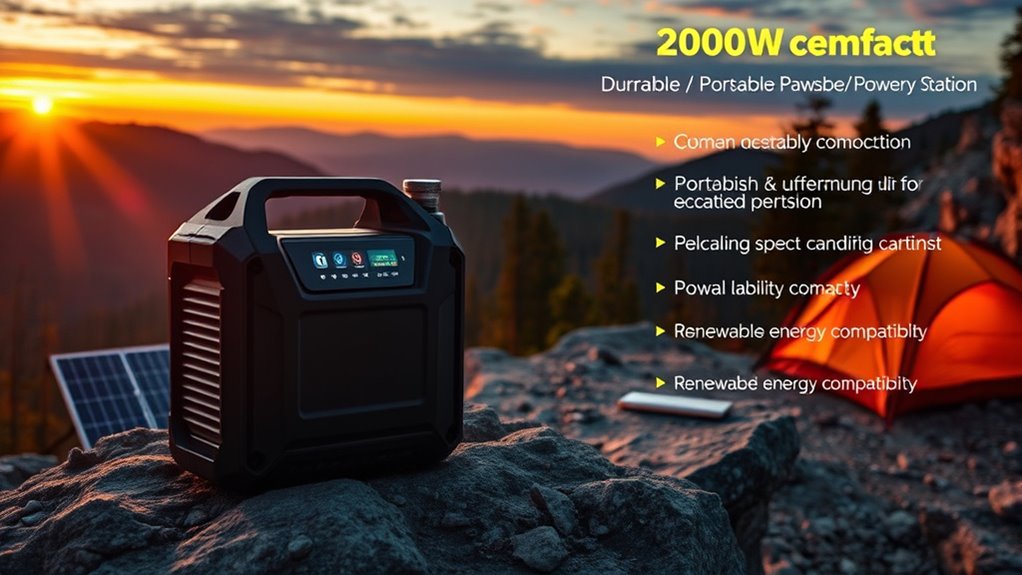
When choosing a portable power station, I focus on matching the power capacity to my needs and ensuring it has the right ports for my devices. I also consider how quickly it charges and the durability of its battery type, along with its weight for ease of transport. These factors help me find a reliable, efficient option for off-grid power.
Power Capacity Needs
Choosing the right portable power station 2000 W starts with understanding your power capacity needs. I recommend calculating the total wattage of all devices you plan to run simultaneously, making sure the station’s capacity exceeds their combined consumption. Pay attention to continuous power output, especially for appliances that require high surge or peak power temporarily. Think about how long you’ll need to power your devices; longer durations may necessitate a higher capacity in watt-hours. Also, consider future needs or additional devices, which might require a station with expandable capacity or a higher baseline wattage. Finally, match the power station’s capacity with your energy sources, like solar panels or AC outlets, to guarantee quick recharging and reliable operation during extended outages.
Port Selection Options
Selecting the right portable power station 2000 W involves more than just capacity; the variety and placement of ports considerably influence how effectively you can power multiple devices. I look for models with a mix of AC, USB-C, USB-A, DC, and car ports to guarantee I can connect all my gadgets simultaneously. It’s crucial to verify the number of outlets; more ports mean greater flexibility, especially when running high-wattage appliances or sensitive electronics. I also check the power ratings for each port to prevent overloads. Placement matters too—ports should be easily accessible and conveniently located for quick connections. Finally, I prefer models with smart port management features that can prioritize or limit power delivery, protecting my devices while maximizing operational efficiency.
Charging Speed & Method
Fast charging capabilities are crucial because they minimize downtime and guarantee my power station is ready to go when I need it most. Reaching 80% in under an hour means I spend less time waiting and more time off-grid. Multiple charging methods, like AC outlets, solar panels, and car adapters, give me flexibility in different environments. The maximum input wattage, often between 700W and 2200W, directly affects how quickly I can recharge, impacting overall usability. Dual or hybrid charging modes, combining solar and AC power, help optimize recharge times and energy efficiency. Plus, MPPT solar controllers improve solar charging efficiency, allowing faster, more reliable renewable energy intake. Choosing a station with versatile, high-speed charging options ensures I stay powered no matter where I am.
Battery Type Durability
Battery durability plays an essential role in ensuring my power station remains reliable over time. I look for batteries like LiFePO4, which can support over 3,000 to 4,000 charge cycles, far surpassing traditional lithium-ion models. This means I get a longer lifespan and better value. The durability also depends on thermal management systems that prevent overheating, protecting the battery during heavy use. A solid Battery Management System (BMS) is vital, as it monitors voltage, current, and temperature to keep everything safe and extend battery life. High-quality batteries built with robust internal components resist degradation from repeated charges. Additionally, environmental factors like temperature and humidity can impact longevity, so I prefer batteries engineered to perform well across a broad range of conditions for dependable off-grid power.
Portability & Weight
When choosing a portable power station, I consider its weight and size because these factors directly affect how easily I can carry and set it up. A unit weighing less than 40 pounds is much easier to transport, especially for outdoor activities or emergencies. Compact dimensions and features like handles or wheels make moving the station more manageable and setup quicker. While heavier units often have larger batteries and more outlets, they can be cumbersome to carry or position. I always balance capacity with weight, since a higher wattage model tends to be bulkier. A lightweight design allows for faster packing, unpacking, and repositioning, which is essential during camping, RV trips, or when frequent relocation is needed. Ultimately, portability enhances convenience and usability in off-grid situations.
Expandability Features
Expanding the capacity of a portable power station can be a game-changer for extended off-grid use, so it’s important to contemplate how easily it can be increased. Many 2000W models support expansion through additional batteries or modules, often boosting capacity to 5kWh or more. This allows for longer runtimes, powering high-demand devices or multiple days without recharging. When evaluating expandability, check for compatibility with extra batteries, connectors, communication protocols, and firmware support to ensure seamless integration. Consider whether the process is straightforward, if extra batteries are included or sold separately, and how increased size and weight might affect portability. Proper expandability features can substantially enhance a station’s versatility, making it a more reliable power source for demanding off-grid scenarios.
Reliability & Safety
Have you ever wondered how to guarantee your portable power station reliably protects your devices? The key is choosing one with strong safety features and durable components. Look for a model with a battery chemistry like LiFePO4, rated for over 3,000 cycles, ensuring long-term performance. Safety certifications such as UL1778, FCC, or CE indicate it has passed rigorous testing for electrical safety and reliability. An automatic shutdown and overload protection system prevent damage during faults or surges, while seamless UPS functionality with a switching time under 20 milliseconds keeps your sensitive electronics safe during outages. Built-in safeguards against overcharging, over-discharging, high temperatures, and short circuits are essential for maintaining safety and extending the power station’s lifespan. Reliability and safety should always be top priorities.
Frequently Asked Questions
How Long Do Portable Power Stations Typically Last Before Needing Replacement?
When you ask how long portable power stations last before needing a replacement, I’d say it depends on usage and quality. Generally, they last around 3 to 5 years with proper care. High-quality units with good battery management can stretch longer, sometimes up to 7 years. I always recommend checking manufacturer warranties and keeping the device charged and stored properly to maximize lifespan.
Can Portable Power Stations Be Used for Medical Devices Safely?
Did you know that over 80% of portable power stations can safely power medical devices? I’ve used mine for essential equipment, and I always check the wattage and surge capacity first. As long as your device’s power needs match the station’s specs, it’s safe. Just remember, for critical medical devices, consulting a professional or manufacturer’s guidelines is always a good idea to guarantee reliability and safety.
Are There Eco-Friendly or Sustainable Portable Power Station Options?
When considering eco-friendly portable power stations, I look for models with solar charging capabilities and sustainable materials. These options reduce reliance on fossil fuels and minimize environmental impact. I prefer brands committed to sustainability, using recyclable components and energy-efficient designs. Not only do they help protect the planet, but they also guarantee reliable off-grid power without guilt. It’s a smart, responsible choice for anyone wanting greener energy solutions.
How Do Weather Conditions Affect Portable Power Station Performance?
Ah, weather—nature’s way of testing our patience and portable power stations. I’ve found that extreme cold can reduce battery efficiency, while heat may cause overheating. Rain or humidity can damage electronics if not properly protected. Honestly, I treat my station like a diva—keeping it sheltered and out of the elements. So, yes, weather does impact performance, but with some care, you can keep your power station running smoothly.
What Maintenance Is Required to Ensure Longevity of a Portable Power Station?
When thinking about maintaining a portable power station, I focus on regular checks and proper storage. I make sure to keep the unit clean and free from dust, periodically charge the battery to prevent it from discharging completely, and follow the manufacturer’s guidelines for firmware updates. Storing it in a cool, dry place also helps extend its lifespan. Consistent maintenance keeps my power station reliable whenever I need it off-grid.
Conclusion
Choosing the right portable power station is like finding a reliable lighthouse in a storm—guiding you safely through unexpected outages or adventures off-grid. With options ranging from 1024Wh to 2400W, I’ve seen firsthand how the right device keeps my essentials alive when the grid goes dark. Think of it as your personal energy anchor, ensuring you’re never left in the dark. Trust me, investing in the right station lights the way forward.




